Questionhi, i have a question about my 9 year old pomeranian. My pomeranian decided maybe a month or so ago that she was going to start barking early in the morning until we give her food. i know the worst thing to do is to give in to the dog, but even when we ignore her she can still bark for hours on end. during the night she stays in her room and like clockwork every morning she starts barking for food. what can i do to stop this constant barking? please help! thanks so much :)
AnswerGreetings, and thank you for contacting All Experts!
Barking in the morning for the purpose of waking up the owners and eliciting them to start their day early is a form of attention-seeking behavior. What increases this form of barking is obviously the act of getting up and attending to the dog by giving it food or attention. To better understand though why a dog continues to bark in the morning despite not getting up, it helps to understand all the mechanisms that come into play when a behavior is about to extinguish.
To better understand the process of extinction which is the process of a behavior diminishing and eventually ending, we can compare a dog's behavior to a big fire. Giving in to a behavior as barking in the morning is adding fuel to the fire. The behavior increases, becomes stronger and is harder to extinguish. If the fuel is not added, the behavior over time, will likely become smaller and easier to extinguish.
Because extinction undergoes some interesting processes, it is worth learning why the act of not getting up still causes your dog to bark or even causes it to increase in intensity and duration. This behavior can be explained as ''extinction bursts''. What happens in an ''extinction burst'' is the behavior increases temporarily, enough to have dog owners believe that the act of not getting up is not working.
Let's take a look at what happens in the dog's mind during an ''extinction burst''. The behavior of barking in the morning had to start somewhere. Very likely, upon barking in the morning you or somebody in your family got up and fed the Pomeranian. Since the barking worked in getting what she wanted, very likely she continued to do so, and very likely you continued getting up and feeding.
Then one day you decided not to get up and ignore the barking thinking this would nip the behavior in the bud. It did not work, your Pomeranian very likely barked even more than before. Why is this? It is because of the process of ''extinction burst''. Basically, your dog is thinking ''My owners this morning are not getting up as usual. I need to INCREASE, my barking in intensity and duration so they get up since just barking a little is not working''. She therefore barked more and perhaps you or somebody else in your family finally tired of hearing her, finally got up.
This only aggravated the behavior. Extinction bursts, take place when an owner tries to stop a behavior by not giving in and the dog increases the behavior to obtain whatever it wants. As much as an extinction burst sounds like an annoying problem, in reality it is a sign that not giving in is working. Giving in, when an extinction burst takes place will only add more fuel to the fire.
Respected trainer and president of Legacy Canine Behavior & Training Inc, Terry Ryan, explains in her book ''The Toolbox for Building A Great Family Dog'' Once you recognize what the rewards are (in your case getting up and feeding) and take them away, the behavior will likely increase immediately. This is known as an ''extinction burst''. In plain words, Gus will get worst before he gets better. It might be frustrating, but take it as a good sign. It's working! You've got his number! Stay the course and the behavior will drop off over time.''.
The secret to stopping the behavior is therefore to never give in. The worst thing that can be done is giving in some days and resisting others. This puts the dog on a ''variable schedule''. What this means is that if the dog barks and gets fed one day and not the next day, the behavior of barking only puts more roots because it works in the same way as ''playing the lottery''. People get hooked on playing the lottery because of the variability of it. Slot machines are based on this principle.
So what is treatment plan? Eventually, your Pomeranian will have some pauses in between barking to draw a breath. These pauses must be used to your advantage. Only get up when there is quiet. If you are getting up and the barking resumes, walk back to your bedroom. Make sure your Pomeranian takes notice of this. She has to hear that her barking is what causes you to not open her door. Quiet brings you closer to opening her room, while barking gets you more distant. Being smart, and looking for rewards, dogs eventually learn that quiet becomes reinforcing and it will eventually replace barking which should gradually extinguish.
Tips:
-Room darkening shades or moving her to another part of the house that is a bit darker may trick her and allow you some extra sleep.
-A bed time snack may help the dog feel less hungry in the morning, especially in dogs fed only once a day.
-Keeping the dog in the same bedroom with the owners may help decrease the barking. A blanket in a corner of the bedroom may be made the ''dog's place''.
-Teach the quiet command. When the dog barks, say ''quiet''. The moment the dog quiets down say ''good!'' and give a treat. If the dog barks, turn your back and ignore.
Important considerations: make sure she is not barking in the morning because she needs to go potty. Most dogs really need to go after keeping it all night. Make sure she is let out to potty last thing in the night. You can also try to let her out to potty early in the morning and then back in the room and see if she stops barking. Also, if she is more clingy and barks when left alone more than usual, consider having her hearing checked. Some dogs as they age, become more clingy and loss of hearing makes them a bit more insecure.
I hope this helped, the barking is not an easy fix, but if you keep it up, you will eventually see results. Best wishes and kind regards,
Adrieene Farricelli CPDT-KA

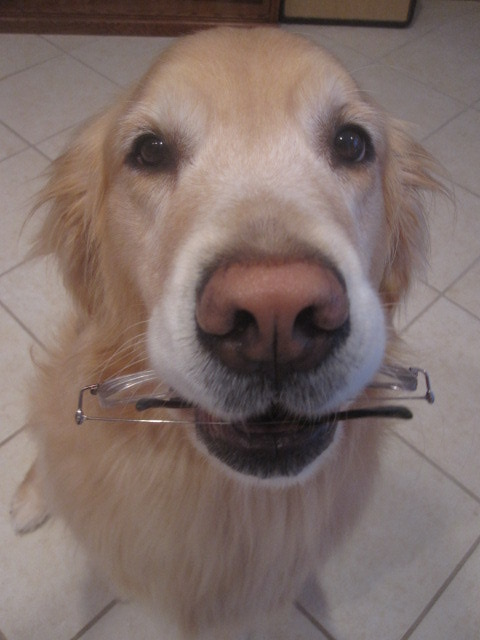 question about beagle puppy
QuestionHello, I have recently acquired a beagle puppy.
question about beagle puppy
QuestionHello, I have recently acquired a beagle puppy.
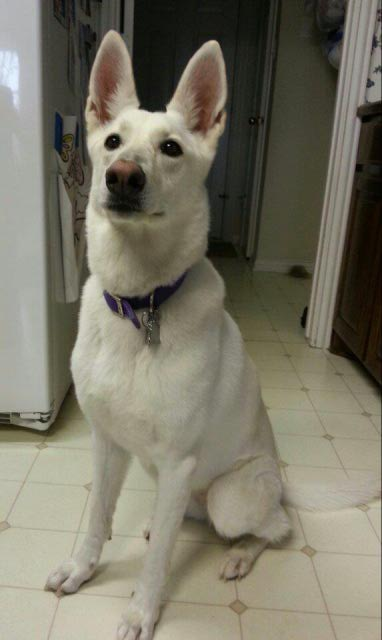 White German Shepherd Aggression
Question
Chloe
A little background on my dog Chl
White German Shepherd Aggression
Question
Chloe
A little background on my dog Chl
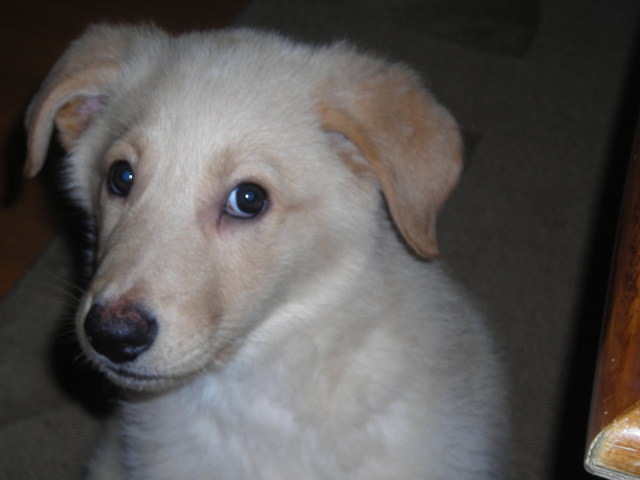 housetraining
QuestionQUESTION: We have a 10 week old retriever/colli
housetraining
QuestionQUESTION: We have a 10 week old retriever/colli
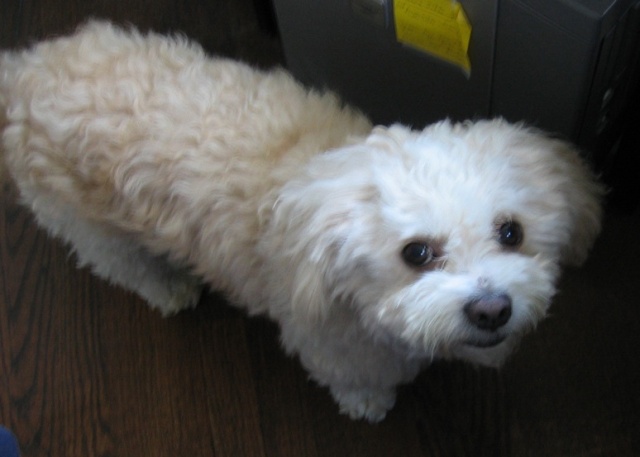 male dog marking while on walks
Question
My dog
I have a 3 year old male dog (probably
male dog marking while on walks
Question
My dog
I have a 3 year old male dog (probably
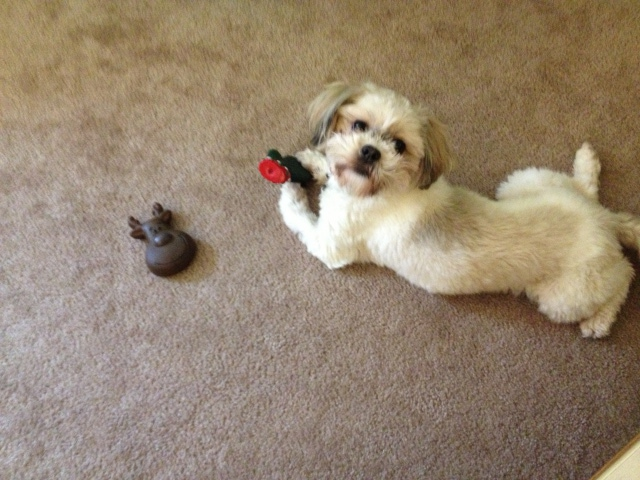 Chewing/Stealing
Question
Clarkie
my shih-tzu Clarkie is 21 month
Chewing/Stealing
Question
Clarkie
my shih-tzu Clarkie is 21 month